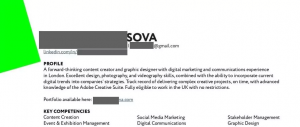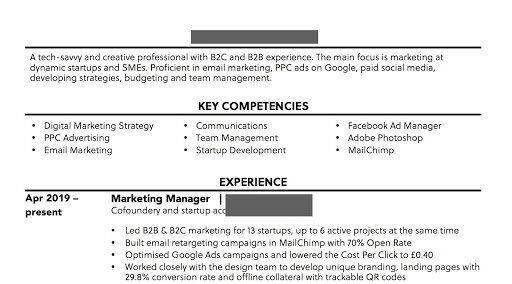A recruiter has only one source of information about you at the early stages of candidate selection, your resume. If it is not structured correctly, no matter how perfect a candidate you make, no one will call you back. In this article, we explain how to write a CV.

We reviewed over 30,000 resumes while working as recruiters in the UK, Germany, Austria, Holland and other countries, and now, as career consultants, we help Russian-speaking job seekers write successful resumes in English. This article contains only genuine 2021 data about the perfect Curriculum Vitae structure, CV examples, and even a quick test to check your understanding. In short, all the key tips on CV writing that you need for the recruiter to love you at first sight, and to get the very dream job at an international company or move to your favourite country.
The article is based on rules and principles that work in the UK, however, most of them are equally applicable in other European countries. We’ll cover the differences at the end of the article.
Contents:
- Design and format
- Resume structure
– Your photo
– Name
– Profile
– Experience
– Education
– Skills & Other - Keywords
- Typical mistakes of job seekers
- What is it like in other countries?
- Bonus: Test
Bonus! A little knowledge test at the bottom of this article.
1. Design and format
A good resume in English is as simple as possible. It seems straightforward, but thousands of applicants forget to double-check the fonts when they “add just one more line”, or even underestimate the importance of a well-balanced design.
Don’t defocus recruiters’ attention – on the contrary, help them see your skills and competencies. To do this, use only one font of a single colour in no more than 3 styles (regular, bold and italic).
Tip: Check the semicolons. It seems like a small thing, but the recruiter will notice if they stand out in the text. We had a case when a candidate for a senior role in finance was turned down by a future manager who said: “If he treated the details in his resume like that, how would he treat my accounts and budgets?”
Don’t use bright coloured fonts – if your resume is printed out on paper, the “jaunty blue” may very well turn into a dull, unreadable gray. Choose black or any other dark, solid colour.
A good example of using a solid green is in this CV breakdown video in English:
In Russia, rules are more flexible, with standards changing from industry to industry. But in the UK, for example, everything is quite conservative. British executives and recruiters are unanimous in their opinion that creativity on a resume is discouraged. Exceptions exist for creative professionals – photographers, designers, animators – who can combine a resume with a portfolio or simply add colours:

When applying for a position at an international company in any country, we strongly recommend not to experiment – you do not know who exactly will be reading your CV in English. You will always benefit from having an orderly resume because it is easier to read and understand.
Save your resume in the format ‘Elizaveta Proselkova CV’ in pdf. Do not include the name of the intended position or company. Firstly, everyone already knows what the company is called, and secondly, it creates the impression that you have sent your resume to a dozen other organizations. The file with your name does not create such associations, therefore it looks more pleasant for the employer.
2. Resume structure
Like we said, in Russia rules are not as strict, with standards changing from industry to industry. Now, a very important point: the initial review of a resume takes 3-5 seconds (!). This is exactly the time a recruiter spends to decide whether a CV is worthwhile reading to the end. It is important to structure the story about yourself and your experience in CV so that the main points are seen instantly.
The structure of a resume in English traditionally consists of the following sections: Name, Profile, Education, Experience, Skills & Other. Names of previous places of work and titles should be highlighted. Each semantic block can be separated by a line to make it easier for the recruiter to navigate the sections:

Your photo
In England, it is not customary to attach a photograph to a resume, and this is one of the few differences from the standards of resume writing in Germany and Austria (see end of article). If an employer wants to see what you look like, they’ll check your LinkedIn page.
By the way, you definitely need a LinkedIn profile. Most European countries are wary of candidates who are not on LinkedIn or at least on its competitor Xing. Do not forget to tidy up your profiles on other social networks, too – statistics show that 70% of employers monitor job seekers’ social networks, where they can see your photos, calculate your age and overall lifestyle.
Name
Your first and last name in English should be here. Attention: contrary to what is written in many articles online, it is not at all necessary that your name exactly matches the data of your passport. Passport office officials often come up with extremely hard-to-read combinations! You can choose an easier way to spell your name (example: Julia instead of Yuliia). It is much more important than your name matches the one on your LinkedIn profile so you can be easily found.
In addition to your name, including the city you live in, a phone number, email and (if any) a link to your LinkedIn or Xing profile. It is optional to indicate age and marital status – however, there are differences in the requirements for different countries, see the end of the article.
Tip: Pay attention to the name of your mailbox – no babochka21@mail.ru or superman99@yandex.ru. Create a google mailbox, ideally, the address should look like this: name.surname@google.com.
Profile / Summary
This section provides an overview of you as a specialist. Keep it short, but at the same time as convincing as possible. 4-5 sentences are the ideal length.
First, speak about your specialization. You can indicate work experience in years. Describe the industry, countries, famous brands you have worked for (if any). Then talk about your technical skills (hard skills) and the so-called soft skills. In the Profile section, you can specify the sought for the title, but it is not required. If you don’t need a work permit, this can be mentioned too.
Use short sentences. Try not to use the pronoun “I” (I, me), but also do not write in the third person. Look for examples in this video.
Avoid cliché adjectives like motivated and hardworking. Describe yourself with adjectives that are specific to your industry (if you are an accountant, you can, for example, use the adjective meticulous ).
Tip: Use numbers in the Profile section. They grab the attention of recruiters and sell you as a specialist.
Experience
In this section of your resume in English, you talk about your work experience (position + responsibilities + achievements). The order is reverse chronological. That is, first you indicate the last position held, and then the one that came before it.
Choose the job title that is most often used in Europe, even if it is written differently in your employment record. Please do not do direct translations from Russian into English! No Chief Expert and Leading Specialist – there are no such positions in the English-speaking world. Do not worry that you may come across as bending the truth as peculiarities of the language and job markets in each country are completely different. Adaptation is absolutely adequate practice.
In order to choose the right title, study the hierarchy of positions in your profession. For example, in Russia, many specialists of various levels are usually called managers, and in the UK there is a very clear division. At the initial level: Executive, Assistant, Coordinator, then Manager, then Head of Department. In the financial sector, these are Analyst, Associate, VP, etc.
If you have experience in different fields, then you can make several resume versions. For example, you work as a lawyer and consider vacancies in law firms, but you are also interested in Compliance in the financial sector. You can draft one resume focusing on your experience in Commercial Law, and in the other one you can mainly talk about responsibilities related directly to Compliance.
Do not use your high qualifications to your detriment – this often happens when moving and looking for work in a new country. For example, you send out your resume to apply for a trainee position, and you state that you have 5 years of experience in this field. You will most likely be considered “overqualified” and your resume will be put aside. In such cases, we recommend: first, to choose positions ranked higher than an intern and second, not to emphasize the high level of the previous positions on the resume.
Tip: Ideally, a resume in English should be tailored for each job.
Each position you list on your resume should include company name, city and country, duration of work (month and year of start and finish). Always state responsibilities and accomplishments for each position. The optimal number of lines is 5-7 per position. For example, 4 responsibilities and 3 achievements with numbers (“increased the company’s profit by XX% due to successful implementation of… and …”).
Use numbers, percentages, and abbreviations to attract attention. Speak about deals, budgets, business process improvements. Measurable accomplishments are more readily accepted by recruiters.
Education
A straightforward section that should be 2-3 lines long. Indicate the specialisation and university, city, country, dates of admission and graduation. Young professionals may also mention a school or a college they went to.
We recommend placing this section after work experience because practical experience is much more looked at. However, recent graduates and professionals with one to two years of experience can move this section to the top.
Skills & Other (Skills and hobbies)
In this section, specify:
- Knowledge of languages in the “language – proficiency level” format.
- Computer skills important in your industry. For example, marketing experts can emphasise the knowledge of design programs or task managers.
- Unusual hobbies. For example, if you played in the theatre or ran a marathon. This will help recruiters remember you.
- Sports achievements. They show such qualities as resistance to stress and dedication. Keep it short. For example, “Sports achievements: ran a Moscow marathon in 2015”.
- Volunteer experience.
- Certificates obtained on online educational platforms (e.g. Coursera).
3. Keywords
Suitable resumes are searched for by keywords. It’s easier and faster to find the right candidate this way. The system is structured as follows: you send a resume to an open vacancy, and then it is sorted by the number of matches with the list of responsibilities that are indicated in the job description. This is done either by a recruiter or by special software.
For example, content writing and SMM are indicated in the marketing specialist job description. This means that these keywords should be present in your resume in English. The more matches with the role description, the higher is the likelihood that you will be invited for an interview.
Only list skills if you actually have them. We strongly do not recommend lying. They will definitely check you and your reputation will be compromised.
4. Top 8 common mistakes candidates make
- Not listing the “daily” duties. Many of our clients exclaim: “Yes, this is clear.” No, it’s not. Just because your job as Project Manager included risk management or interviewing candidates, it does not mean that the English employer will guess that. Indeed, in different companies, Project Managers may have different responsibilities.
- Not indicating the knowledge of Russian – or any other language! Even if you have a clearly Russian/German/Italian etc. name and surname, you must be sure to state that you speak the language.
- Solid text. It interferes with grasping the essence, is poorly read and is therefore perceived as disrespect towards the person reading your CV.
- Small font. Some resort to smaller fonts to fit as much information as possible. Don’t do that. Use a font no smaller than 10.5.
- One resume for all vacancies. If you want to get a job as a chef at a restaurant, you will hardly talk about your knowledge of Photoshop. The same goes for applying for the same position in different companies. Each employer has their own requirements for personal and professional qualities of the candidates. It is important to positively present yourself from the angle that is important to the employer.
- Cliché wordings. For example, highly organised or motivated. This is already so commonplace that it is no longer perceived as an advantage. Better replace it with adjectives driven, technical, reliable. Read our articles on adjectives for an effective resume and action verbs to replace the annoying managed and was responsible for .
- Excessive creativity. England is a conservative country. You will show respect for the rules with your low-key well structured resume. The exception is creative professions such as marketing specialist and designer. But even in this case, it is better to add only a drop of creativity.
- Errors. After stating all the information, do not forget to read the resume again. Recruiters do not favour grammatical, punctuation and spelling mistakes, even if it is a single one. The same applies to inconsistent sentences and misplaced periods (with a space in front of a punctuation mark).
Sometimes the fate of the CV is decided by mere trifles: for example, a wrong phone number is indicated or a hyperlink in the document does not work. It seems strange, but such cases are very common. If you are a valuable specialist, then, of course, they will forgive you, but more often than not, recruiters receive 150 resumes for one position a day and you really can’t afford to make any mistakes. Ideally, it is better to contact a native speaker who will check the wording and correct it if necessary.
5. What is it like in other countries?
Our resume guide is based on UK experience, but you can use it to write any resume in English with a few exceptions. In Germany and Austria, for example, the following differences may be possible:
You MAY provide a photo and indicate your date of birth. This will be viewed negatively in the UK.
Alexandra Samodova, our consultant in Germany, says: “Employers have no right to require this information under the personal data protection law, but for a resume in Germany I recommend including a little more personal information than in the UK. In my opinion, the more the parties know about each other, the more productive their communication is. “
6. Bonus: Test
Read the three descriptions for the Profile section. Which one is correct? Try to remember what we talked about in the article.
- A self-motivated, organised and committed individual with the ability to pay attention to details and increase efficiency and productivity. Quick to understand new ideas and concepts and able to work on my own initiative to meet deadlines.
- Recent graduate in marketing. Expert in graphic design programs. My hobby is sports, including swimming and running.
- A tech-savvy digital marketing professional with 7 years of experience across social media marketing, influencer marketing and email marketing. Background of working for both startups and corporations. Skilled in A to Z project management and coordination of cross functional teams.
Answers
- Bad option to fill in the Profile section. Along with clichés, it has a lot of vague wordings and very little professional experience.
- You shouldn’t write about your hobbies in this section. Instead, it is better to indicate what kind of job and in what field you are looking for. There is not enough information about which software you know how to work with.
- Information is brief and to the point, does not compromise the meaning. It gives a detailed view of the applicant. Emphasises the candidate’s key skills.
If you need help with a resume in English, we invite you for an initial consultation with an EP Advisory consultant of your choice.


